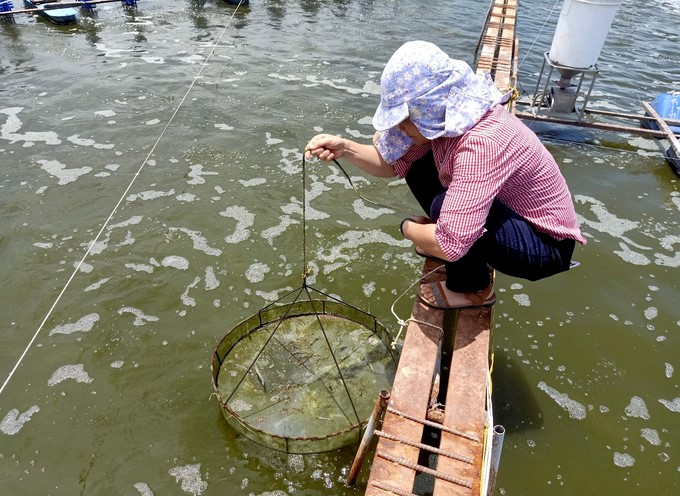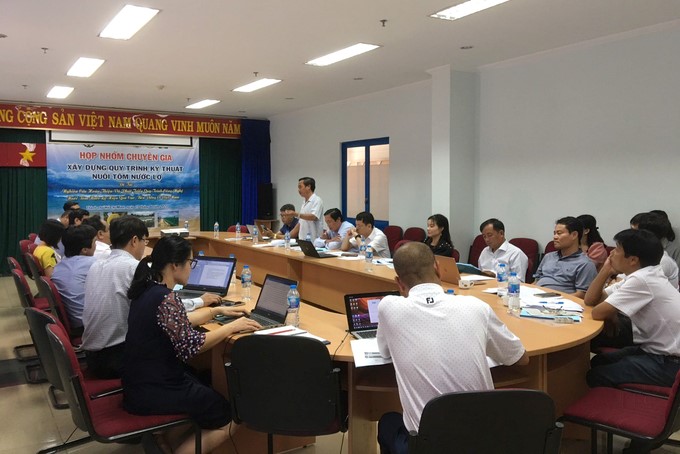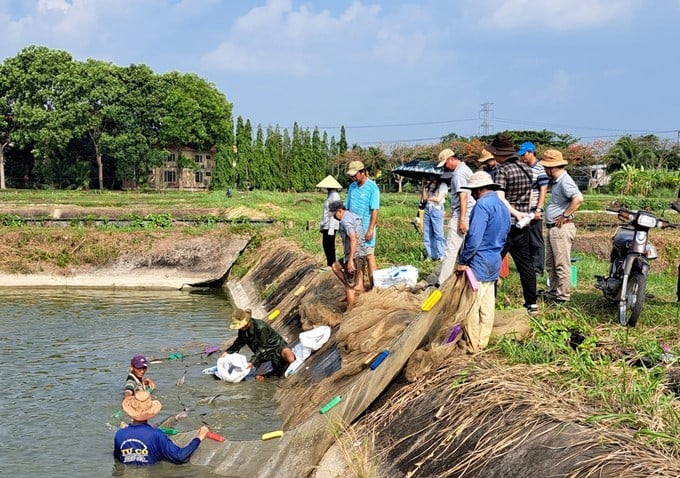May 21, 2025 | 04:35 GMT +7
May 21, 2025 | 04:35 GMT +7
Hotline: 0913.378.918
May 21, 2025 | 04:35 GMT +7
Hotline: 0913.378.918

Examination of shrimp in the topic "Research on the production of microbial preparations against vibrio spp. causing acute hepatopancreatic necrosis disease in giant tiger prawn and whiteleg shrimp" conducted by RIA 2. Photo: Thanh Son.
According to Ph.D. Nguyen Thanh Tung, Director of the Research Institute for Aquaculture No. 2 (RIA 2), In the 2018–2022 period, the institute's autonomy in frequent expenditures reached an average of nearly 83% per year. It is expected that in the first year of the 2023–2027 period, the institute will also maintain the same level of autonomy.
RIA 2 has stepped up to generate revenue from scientific research activities through selection and bidding. This source of revenue accounts for a large proportion of the institute's entire autonomous revenue (approximately 85%). In 2022, the revenue from scientific research activities of RIA 2 reached an estimated VND 37 billion.
To generate good revenue from scientific research, the secret of RIA 2 lies in taking the initiative. First of all, the institute actively participates in proposing ideas for annual scientific research tasks of the Ministry of Science and Technology (MOST) and the Ministry of Agriculture and Rural Development (MARD) related to fisheries. Many of the institute’s ideas have been selected by MARD for scientific and technological research tasks and organized tenders which involve fisheries research institutes and establishments nationwide, including RIA 2.
Among the approved ideas, there are typical projects such as the project to produce a large-sized giant tiger prawn variety, research into herbal nanomedicine for disease resistance in giant tiger prawns, along with some aquaculture technologies. Especially in recent years, sea crab farming in Ca Mau has often faced epidemic diseases in crabs. After proposing ideas to prevent and treat the diseases, RIA 2 has received agreement from MARD to deploy scientific research on disease prevention and treatment for sea crabs in the Mekong Delta as well as in the whole country.
RIA 2 actively connects with localities and businesses to carry out scientific research activities. In 2022, RIA 2 and the Ho Chi Minh City Department of Agriculture and Rural Development signed a Memorandum of Understanding on cooperation in the exchange of information and orientations for coordination in research and development in the field of fisheries between the two units in the period of 2022–2025, with a vision to 2030.
In addition, RIA 2 has also been preparing to sign a memorandum of understanding with several Departments of Agriculture and Rural Development and Departments of Science and Technology of provinces and cities in the Mekong Delta area to further push cooperation and research in the field of fisheries.

Expert consultation workshop on the topic "Research to perfect and develop a technological process for high-efficiency and sustainable brackish water shrimp farming in Vietnam", organized by RIA 2. Photo: Thanh Son.
The acumen of the staff has significantly contributed to RIA 2's participation in many of the localities’ scientific research activities in recent years. Ph.D. Nguyen Thanh Tung shared that the institute's staff are very "sharp-eared" and active. Hearing which localities need research on certain topics that are in the field of fisheries and suitable for the research capacity of RIA 2, everyone will immediately notify the agency, and the Institute's leaders will immediately go to the localities to co-finalize research ideas and even propose more ideas for the localities to have the best choice.
The implementation of the localities’ scientific research activities accounts for 20–30% of the institute's revenue and has great potential for exploitation and expansion in the coming years. Not only contributing to a significant increase in revenue but also actively participating in the localities’ scientific research topics has helped RIA 2 have more successful projects, thereby affirming the Institute’s capacity. Typically, the project of applying the RAS recirculation system to pangasius catfish farming in An Giang attains a survival rate of nearly 100%.
Research units under RIA 2 are also proactive in generating revenue, such as by promoting the production technology transfer of successfully researched aquatic varieties to localities and, at the same time, actively producing seeds of these varieties in order to serve the commercial farming needs of farmers. The units also actively exploit the water surface area to raise aquatic species that have mastered technology and have markets, such as white leg shrimp, giant barb, Pangasius sanitwongsei, pangasius catfish, etc., thereby increasing revenue for the unit as well as the staff’s income.
Ph.D. Nguyen Thanh Tung said that in order to meet the autonomy path of non-business units in the coming years, RIA 2 will continue to focus on taking advantage of the effective implementation of the programs on variety selection and creation and propagation of traditional key cultured objects, including giant tiger prawn, white leg shrimp, pangasius catfish, tilapia, all-male giant freshwater prawn, local species, etc., thereby creating high-quality products and contributing to promoting production in the provinces in the Mekong Delta.

The Ministry of Science and Technology inspects the field of state-level projects and projects implemented at the National Center for Freshwater Breeding in the South under RIA 2. Photo: Thanh Son.
The Institute will focus on better maximizing the use of material facilities to promote the production and services of key products and strengths to meet current practical needs, such as seed production (pangasius catfish, tilapia, giant freshwater prawn, crab, saltwater fish, brackish water shrimp, and mollusca), and producing a number of indigenous aquatic objects with high economic value. such as giant barb, Chinese pangasid catfish, Jullien's golden carp, and zigzag eel.
RIA 2 continues to develop international cooperation relationships to improve research capacity and train human resources for the Institute. Over the years, RIA 2 has always focused on improving the quality of human resources, such as by providing domestic and overseas postgraduate training according to the professional orientation of the Institute and its dependent units. Promote and encourage researchers to publish scientific articles in prestigious international journals to promote the institute's research works and seek more cooperation opportunities.
In addition to maintaining cooperation with traditional partners, RIA 2 will continue to take advantage of opportunities to expand cooperation relationships with international organizations and universities to seek cooperation opportunities. Research and train the research staff of the Institute.
Besides, implement well the projects to upgrade the potential of material facilities for the Institute, such as the project “Large Repair- Small Repair”, public investment projects for the Institute in Thu Duc, Tien Giang, Bac Lieu, and Ba Ria-Vung Tau, and investment packages from other capital sources.
Ph.D. Nguyen Thanh Tung, Director of the Research Institute of Aquaculture No. 2
There is a problem related to the implementation of many scientific research projects after winning the bid that RIA 2 and many other institutes are facing, which is the bidding documents related to the reciprocal funding of the participating enterprises. implementing the topic. This reciprocal funding is expended by the enterprise, but it is still required to make the bidding documents, as it is with the funding from the state budget. This makes many scientists very afraid to do trial production projects that have reciprocal funding from participating enterprises. If this problem can be removed, it will create great advantages for institutes in implementing scientific research projects with the participation of enterprises.
Translated by Huyen Vu Thu

(VAN) Japan's grant aid project contributes to capacity building, promoting organic agricultural production, and fostering sustainable community development in Dong Thap province.

(VAN) For years, the CRISPR-Cas9 genome technology has been reshaping genetic engineering, a precision tool to transform everything from agriculture to medicine.

(VAN) Vietnam aims to become a 'leader' in the region in the capacity and managing effectively soil health and crop nutrition.
![Reducing emissions from rice fields: [Part 1] Farming clean rice together](https://t.ex-cdn.com/nongnghiepmoitruong.vn/608w/files/news/2025/05/05/z6509661417740_a647202949c539012a959e841c03e1d3-nongnghiep-143611.jpg)
(VAN) Growing clean rice helps reduce environmental pollution while increasing income, allowing farmers to feel secure in production and remain committed to their fields for the long term.
/2025/05/19/5136-1-144800_230.jpg)
(VAN) The Nghe An Provincial People's Committee has just approved the list of beneficiaries eligible for revenue from the Emission Reductions Payment Agreement (ERPA) in the North Central region for the year 2025.

(VAN) 14 out of 35 domesticated elephants in Dak Lak province have had their living conditions improved, with 11 of them currently participating in the non-riding elephant tourism model.

(VAN) Muong Nhe Nature Reserve hopes that being upgraded to a national park will lay the foundation for forest protection efforts to be carried out in a systematic, modern, and sustainable manner.